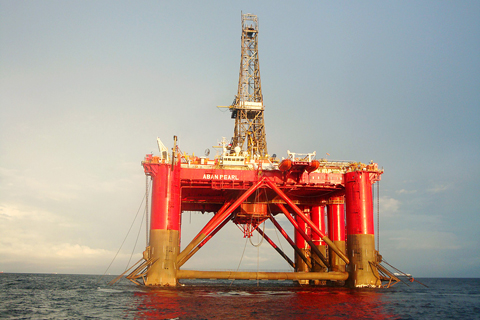A Venezuelan natural gas exploration rig sank in the Caribbean sea early on Thursday, though all 95 workers on the were rescued and there was no gas leak, the government said.
The accident occurred less than a month after a deadly explosion in the Gulf of Mexico sank a BP-owned oil rig, claiming 11 lives and triggering one of the world’s worst-ever oil spills, threatening sensitive coastal areas.
Venezuelan Energy Minister Rafael Ramirez said the well being explored by the Aban Pearl platform had been safely sealed after the rig sank near the northeast coast, close to Trinidad and Tobago.

PHOTO: AFP
“This is different from the Gulf of Mexico, because it is a testing well,” Ramirez said.
The rig’s captain, an Indian national, and one of the last three engineers on board, had to dive into the sea as the football field-sized platform disappeared beneath the waves, he said.
“At 2:20am the rig sank completely. I flew over it this morning and there is nothing to see,” Ramirez said in an interview.
The Aban Pearl was the first offshore gas rig operated by state oil company PDVSA. State television frequently portrayed the platform as evidence of Venezuela’s engineering prowess.
The OPEC nation has been producing oil for more than a century, but almost all of its oil and gas output comes from onshore projects or inland Lake Maracaibo. Offshore drilling, especially deep water production, is expected to provide more of the world’s oil supply as production in onshore fields declines and demand rises.
The BP spill has prompted a push for tighter offshore drilling regulations in the US. The Venezuelan accident could prompt still more scrutiny of the industry.
“This is adding PR insult to injury,” Tyler Priest, director of global studies at the Bauer College of Business, University of Houston and author of a book about Shell’s offshore Gulf of Mexico activities, said when asked about the two accidents happening so close together.
Venezuelan President Hugo Chavez broke news of the accident on the rig — owned by India’s Aban Offshore in alliance with Singapore-based Petromarine Energy Services Ltd — at 3:11am from his Twitter account, @chavezcandanga.
Critics say Chavez wrecked PDVSA by firing thousands of managers and technicians after a strike in 2002. The company,. the main financer of his socialist revolution, has suffered cash flow problems as oil prices have fallen.
In recent years, Venezuela, one of the world’s leading oil exporters, has endured a series of fires and maintenance problems at its network of refineries. Nationalization of foreign-owned projects, new foreign investment and higher taxes have bolstered PDVSA’s coffers.
The Latin American nation sits on some of the world’s largest offshore natural gas reserves, but PDVSA is not yet producing offshore gas. Fears of rule changes and pricing issues mean the company has struggled to attract investment from foreign companies with the necessary expertise.
Ramirez said submersible robots would probe the cause of the accident, which appeared to be a sudden surge of water entering a submarine raft that the rig’s legs float on.
“There are several hypothesis about the cause but nothing has been proved yet. We are going to send underwater robots because divers cannot enter there,” the minister said.
He also noted that safety valves and other mechanisms have sealed the well, with no risk of a leak.
The rig owner may try to refloat the Aban Pearl and two more exploration rigs are traveling to Venezuela from India, Ramiriz said.

Ten cheetah cubs held in captivity since birth and destined for international wildlife trade markets have been rescued in Somaliland, a breakaway region of Somalia. They were all in stable condition despite all of them having been undernourished and limping due to being tied in captivity for months, said Laurie Marker, founder of the Cheetah Conservation Fund, which is caring for the cubs. One eight-month-old cub was unable to walk after been tied up for six months, while a five-month-old was “very malnourished [a bag of bones], with sores all over her body and full of botfly maggots which are under the

BRUSHED OFF: An ambassador to Australia previously said that Beijing does not see a reason to apologize for its naval exercises and military maneuvers in international areas China set off alarm bells in New Zealand when it dispatched powerful warships on unprecedented missions in the South Pacific without explanation, military documents showed. Beijing has spent years expanding its reach in the southern Pacific Ocean, courting island nations with new hospitals, freshly paved roads and generous offers of climate aid. However, these diplomatic efforts have increasingly been accompanied by more overt displays of military power. Three Chinese warships sailed the Tasman Sea between Australia and New Zealand in February, the first time such a task group had been sighted in those waters. “We have never seen vessels with this capability

A Japanese city would urge all smartphone users to limit screen time to two hours a day outside work or school under a proposed ordinance that includes no penalties. The limit — which would be recommended for all residents in Toyoake City — would not be binding and there would be no penalties incurred for higher usage, the draft ordinance showed. The proposal aims “to prevent excessive use of devices causing physical and mental health issues... including sleep problems,” Mayor Masafumi Koki said yesterday. The draft urges elementary-school students to avoid smartphones after 9pm, and junior-high students and older are advised not

Chinese President Xi Jinping (習近平) attended a grand ceremony in Lhasa yesterday during a rare visit to Tibet, where he urged “ethnic unity and religious harmony” in a region where China is accused of human rights abuses. The vast high-altitude area on the country’s western edge, established as an autonomous region in 1965 — six years after the 14th Dalai Lama fled into exile — was once a hotbed for protest against Chinese Communist Party rule. Rights groups accuse Beijing’s leaders of suppressing Tibetan culture and imposing massive surveillance, although authorities claim their policies have fostered stability and rapid economic development in